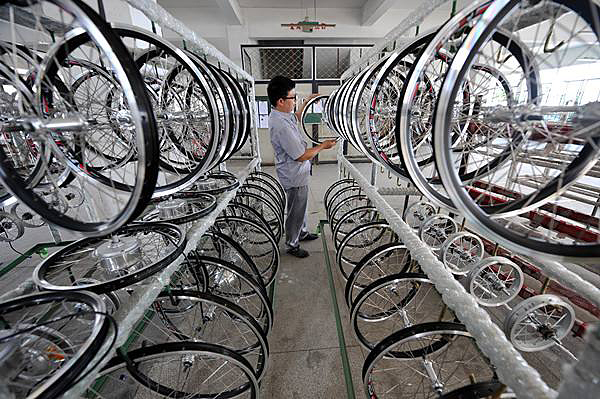EU protectionists deny Chinese bid for market economy status

A worker inspects products at a wheel and axle workshop of Zhejiang BAOGL Vehicle Co., Ltd. This small Chinese vehicle enterprise won in its appeal against the European Union in an anti-dumping investigation in 2013.
On May 12, the European Parliament passed a resolution denying China market economy status.
Though it is a non-binding decision, it sends the wrong message about the reality of China-Europe economic relations, according to some experts. Various interest groups within the European Union have expressed conflicting views on the issue.
Opponents of China’s market economy status look at the Asian nation as a scapegoat for Europe’s economic woes, arguing that granting the status will only benefit China and that local industries will be undercut by an influx of Chinese goods.
Trade disputes account just about 2 percent of total trade between China and Europe, said Chen Xin, a researcher at Institute of European Studies, Chinese Academy of Social Sciences. The real impact has been exaggerated by the media, he said.
Some scholars argue that granting China market economy status is in alignment with the long-term trends of trade development between China and Europe. They say the EU will benefit more from trade by abandoning protectionism.
Market economy status is an important factor taken into consideration when calculating the dumping margin in an anti-dumping investigation. The corresponding concept is non-market economic status. Protectionist trade systems established on these two concepts, especially the surrogate country system, have long favored developed countries in anti-dumping investigations and the imposition of higher anti-dumping duties.
The Chinese government has urged the European Union to grant market economy status ever since the country’s accession to the WTO. However, China has been denied the status because EU policy-makers say it fails to fulfill the European criteria for a market economy.
Chen countered that the European Union does not really have criteria for what constitutes a market economy. Instead, it has criteria for industries, he said. The topic of the negotiation between China and the European Union actually is so-called full market economy status. Exceptions have been made and market economy treatments have been granted to some industries and enterprises if they can prove that they have fulfilled relevant EU criteria for industries, Chen said.
Contradictory attitudes were seen in the conflicts among the institutions of the European Union and its member states. On one hand, the European Union is aware of the trend of economic cooperation between China and Europe. On the other hand, it still seeks to maintain its trade protectionism.
Cui Hongjian, director of the Department for European Studies at the China Institute of International Studies, said that eventually the European Union will decide whether to grant China market status based on three factors: law, the interests of member states and industries, and external influence.
First, the European Union will interpret the laws in a way that best serves its own interest and expand its room for action. Second, EU will balance the interests of its member states and industries, such as steel, textile and the photovoltaic industry. Finally, the European Union will coordinate its policies with the United States, Japan and other developed countries that refuse to grant China market economy status.
